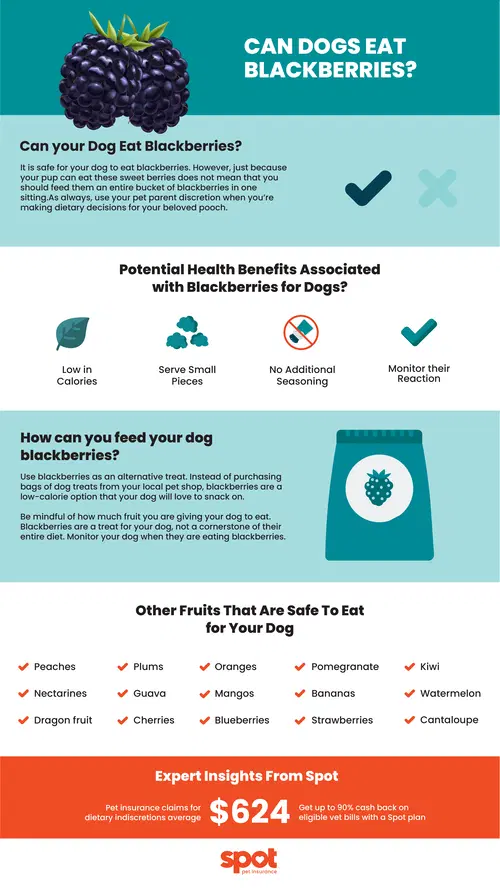Many humans enjoy snacking on blackberries, but can dogs eat blackberries too? The answer is yes! Blackberries can be a healthy and delicious treat for your canine companion. However, like any human food, it's essential to understand the benefits, risks, and best practices for feeding blackberries to your dog.
Are Blackberries Safe for Dogs?
Yes, blackberries are generally safe for dogs to eat. They are not toxic and can even provide some nutritional benefits. However, moderation is key. Too many blackberries can lead to digestive upset, so it's important to offer them as an occasional treat rather than a significant part of your dog's diet.

Blackberry Benefits for Dogs
Blackberries offer several nutritional advantages for dogs:
Low in Calories: Blackberries are a low-calorie treat, making them a good option for dogs who need to watch their weight.
High in Vitamins and Nutrients: Blackberries are packed with essential vitamins and nutrients, including fiber, vitamin C, vitamin K, and manganese.
Fiber: Fiber aids in digestion, helps regulate blood sugar levels, and can contribute to weight management.
Vitamin C: This powerful antioxidant helps protect cells from damage, supports the immune system, and may even help slow cognitive decline.
Vitamin K: Essential for blood clotting and bone health.
Manganese: Plays a role in energy production, metabolism, and bone and cartilage maintenance.
How Many Blackberries Can a Dog Eat?
The appropriate amount of blackberries for your dog depends on their size and overall health. Start with a small amount (one or two berries) and monitor your dog for any adverse reactions. If they tolerate them well, you can gradually increase the amount. As a general guideline, treats, including blackberries, should not make up more than 10% of your dog's daily caloric intake.
Potential Risks of Feeding Blackberries to Dogs
While blackberries are generally safe for dogs, there are a few potential risks to consider:
Digestive Upset: Feeding too many blackberries can lead to diarrhea or an upset stomach.
Choking Hazard: Small dogs, especially, could choke on whole blackberries. It's best to cut them into smaller pieces for smaller breeds.
Allergies: While rare, some dogs may be allergic to blackberries. Watch for any signs of an allergic reaction, such as itching, swelling, or difficulty breathing.
How to Feed Blackberries to Your Dog
Wash Thoroughly: Always wash blackberries thoroughly before feeding them to your dog to remove any dirt or pesticides.
Fresh or Frozen: You can offer blackberries fresh or frozen. Frozen blackberries can be a refreshing treat on a hot day.
Mix with Food: You can add blackberries to your dog's food or offer them as a standalone treat.
Monitor Your Dog: Always supervise your dog when they are eating blackberries, especially if they are new to their diet.
Expert Insights From Spot
Tempting as it may be to share our favorite foods with our pets, it's vital to recognize that not all human foods are safe for dogs. According to Spot's internal data, pet insurance claims for dietary indiscretions average $642*, emphasizing the importance of caution and thorough research before treating your pet to a snack.
Conclusion
Blackberries can be a healthy and enjoyable treat for your dog when offered in moderation. They provide essential vitamins, minerals, and antioxidants that can contribute to your dog's overall health. However, it's important to be mindful of potential risks and to introduce blackberries gradually. By following these guidelines, you can help your dog enjoy the benefits of blackberries without any adverse effects.

I’m Charlie: canine enthusiast with a knack for figuring out why my dog, Dallas, is more infatuated with tennis balls than me. My lifelong passion for dogs has created a dedication to help other pet parents better understands their furry family members!
*Jan 2019 to Aug 2024 Spot Pet Insurance Services, LLC claims data.
Reisen, Jan. “Can Dogs Eat Blackberries?” American Kennel Club, 16 Sept. 2022, www.akc.org/expert-advice/nutrition/can-dogs-eat-blackberries/.
“The Facts on Fiber in Dog Food.” American Kennel Club, 13 Jul. 2023, www.akc.org/expert-advice/nutrition/what-is-fiber-and-why-does-your-dog-need-it-in-their-diet/.
Burke, Anna. “7 Vitamins Your Dog Needs for a Healthy Lifestyle.” American Kennel Club, 14 Mar. 2024, www.akc.org/expert-advice/nutrition/vitamins-dogs-need-healthy-lifestyle/.
“Manganese for Raw Feeders.” Feedreal.com, n.d., www.feedreal.com/articles/manganese-for-raw-feeders.
“Fruits & Vegetables Dogs Can and Can’t Eat.” American Kennel Club, 26 Mar. 2024, www.akc.org/expert-advice/nutrition/fruits-vegetables-dogs-can-and-cant-eat/.
The information presented in this article is for educational and informational purposes only and does not constitute or substitute for the advice of your veterinarian.











